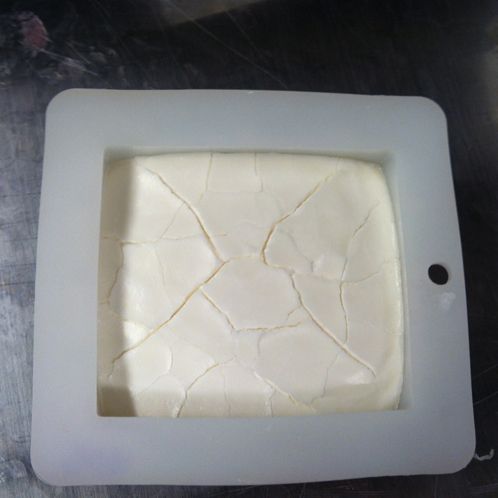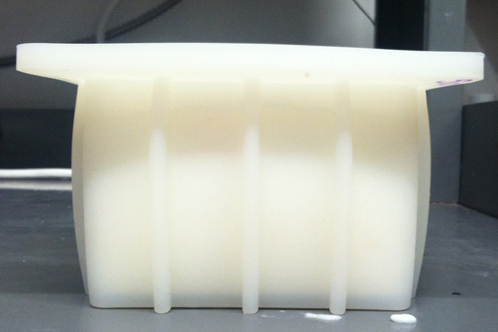All Olive Oils Are Not Created Equal
Many sopamaking oils can be found in grocery store
aisles, and after awhile it begins to beg the question — can you really
use store bought oils in your soaps? While this may seem like an easy,
convenient and inexpensive option, we did a little research to find out.
What we found was sadly not surprising.
 The Test
The Test




.
 The Test
The Test
We tested 10 olive oils total, including our own Pure Olive Oil and Pomace Olive Oil.
These Olive Oil were small sizes, purchased off of retail store shelves
at a local grocery store and a chain grocery store (generally, 8 to 16
ounce sizes; the smallest each brand had to offer). Each recipe was
comprised of 100% olive oil, made in 1 lb. batches, had no water
discounting and used a 5% superfat. We soaped at the same temperature
for all 10 batches and soaped all 10 batches over a 2 day period to
ensure as close as the same temperature and humidity conditions as
possible for gel phase and cure time. We tested store brands as well as
private labels, and every kind of olive oil from ‘virgin’ to ‘extra
virgin’ to ‘light’. All bottles listed “Olive Oil” as the only
ingredient on their labels.
The Results

Here
are the results of the tests after unmolding. As you can see, some of
the tests did some interesting things. What’s more, all of the
store-bought oils except one exhibited terrible DOS
after only a month! DOS is a common soapmaking acronym and it stands
for “Dreaded Orange Spots.” Old or unpure oils can go rancid in soap,
producing the tiny orange spots that give DOS its name. They’re not
harmful, but they don’t make for pretty (or good smelling) soap. This
lead us to believe that while these olive oils appeared to be fresh and
pure, there may have been extra additives or old oil stock in them that
caused the soaps to go downhill so quickly. The most interesting example
was a soap made with “light” virgin olive oil:

This
had one of the most bizarre textures we have ever seen! The batter was
extremely hot after pouring, and then developed a spongy, foamy texture.
It also formed a thick layer of cake-y soda ash on top.

The
same soap from the side. The heat caused some crazy expansion which
bowed out the sides of the super-duper reinforced silicone mold.
Our Verdict
The
results of these tests speak for themselves. While you technically can
make soap with small sized store-bought oils, you can see that the
results can be unpredictable and in these tests, didn’t result in the
highest quality soaps. In these tests, only the soaps made with Bramble
Berry’s Pure and Pomace
Olive Oils stood the test of time and did not behave poorly or develop
DOS. If you are going to use store bought oils, always do a small test
batch before doing a large batch. And if you do some test batches, I
want to hear your results after a few months of curing time. I was
extremely surprised by the poor showing. I have successfully (for years)
used Sam’s Club, Costco, and Cash ‘n’ Carry bulk oils with success. I
suspect these results from smaller grocery chains were because the lower
down the chain the oils get, the more options there are for
adulteration and excessive aging. After all, who knows how often a
grocery store turns over its Olive Oil supply?
The
soapmaking process involves many factors and variables that can cause
things to go awry, and the best you can do is buy soapmaking oils from a
reliable vendor who can verify their quality and purity.
Bonus: An All Olive Oil recipe
Olive
oil is one of the few oils you can use up to 100% of in your soaping
recipes. It produces a lush, nourishing bar of soap. Soap made with 100%
olive oil is also known as Castile soap, which is named after the
region in Spain where the soap first originated. Castile soap takes much
longer to harden up than traditional cold process recipes, so be
patient when making Castile soap. It may take up to double the wait time
before you can unmold it! Bramble Berry carries several Castile soap
products, including Natural Castile Liquid Soap Base and Castile Rebatch. If you’d like to try your hand at making an olive oil soap, the Buttermilk Baby Bastille Bar
is a great starting point. Although it also contains coconut milk in
addition to olive oil, it’s a great introduction to high olive oil
content recipes.

The post All Olive Oils Are Not Created Equal appeared first on Soap Queen.
.
No comments:
Post a Comment